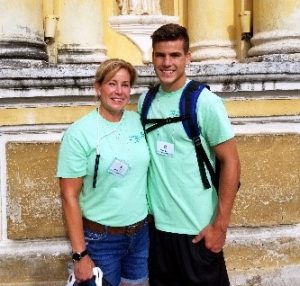I carefully listened to Linda Esposto on Guatemala “packing day “in the Surgicorps office about the list of incidentals to remember for the trip: what to bring, what not to eat or drink, about the hotel, the hospital, the crew and so on. As an anxious first-timer trying to be well prepared, I asked past team members, what to expect. Key suggestions: purchase a nice sized backpack, bring clothes you are prepared to leave behind for the Guatemalan people and, as Linda said many times, “Guard your medical bag with your life!” I felt prepared, but nervous for the unknown.
I met my first Surgicorps team members at the United check- in line in Pittsburgh. Jodie, a surgical nurse and Katie a nurse anesthetist, greeted both my son Jono, 17, also a first-timer and I with bright smiles at four o’clock in the morning. Later we met a friendly young woman Amelia, a senior at Penn State as we headed to security. Amelia was making her fourth trip to Guatemala as a Spanish translator. “Go this way, you’re already TSA Prechecked, see? Most Surgicorps medical mission travelers are TSA PRE-checked and you will go through security fast.” Amelia said with a smile. The teammate connections and relationships were already beginning.
As my son and I walked to the gate we discussed our meeting of two nurses and a translator, both valuable team members offering a skilled service. What would we, a stay at home mom and a rising high school senior with average Spanish capabilities, be able to contribute on this medical mission I wondered?
When we arrived at baggage claim in Guatemala, Surgicorps’s team members from Pittsburgh, Boston and New York gathered. I saw a red headed woman with a Boston accent taking charge collecting the medical bags on a cart. Anxious that our medical bags were getting hijacked, I stopped the woman in action only to find out she was Stephanie Charron, the trip coordinator. She assured me, all was safe and sound.
Monday was patient screening day. A busy day for both medical and non-medical team members. All Surgicorps members met at Obras Sociales del Santo Hermano Pedro Hospital cafeteria to review the rules, regulations and procedures of the hospital. Once completed, we headed upstairs to be greeted by masses of patients-in-waiting. Beautiful Guatemalan families with eager looking and gentle faces filled the chairs that lined the walls of the open-air quadrangle. My son and I were assigned to take Polaroid photos of every patient, assign them a number and secure a wrist band with that same number. The patients were young, old and many were shy, but they were always trusting. It only took a gentle touch to their shoulder with a smile and simple Spanish phrases like like “muy bonita” (very pretty) and Jono and I would have a new friend. It was a hectic and fast-paced day. When time permitted in between photos, we supplied coloring books, crayons, and a few treats to distract the younger ones as they waited. The photographed patients went on to be evaluated by the various surgeons and anesthesiologists for potential surgeries.
Monday through Friday were surgery days. White hand-written papers of operating room surgical schedules dawned the walls explaining who was getting what surgery, with which surgeon, and at what time. I recognized several of the names on theses schedules as those I had connected with during screening. Our job – Jono and me — was to comfort and ease any fears in the pre-operative waiting area, and assist the nurses taking vital of patients in post-operative.
Pre-op could be difficult as often patients had a long wait time. It isn’t particularly easy for a toddler to lay waiting for an hour or longer to be rolled into surgery.It was even more difficult for the young mothers who waited nervously with their children. My son and I would divert their attention with iPad games or just a game of peek-a-boo. We made sure not to neglect the young mothers with smiles and hugs to ease their fears. Jono and I made a lot of fast friends on surgery days: Yeichler, Jamie, Juan, Eugenia and Javier are some of the patients we remember fondly and miss now, months after the trip ended.
Friday, the last night, was a very special one as the entire team is treated to a beautiful dinner.. The restaurant was in a beautiful old Spanish building with each room alluringly enhanced by candlelight. As I went to sit down next to my son, I realized both the seats on either side were occupied. His table was full of Surgicorps team members he had grown close with in just a week’s time and he was fully immersed in conversation with them. His new friends are some of the most interesting people we have ever met. Jono had many things to talk about with them, like their global travel experiences, new food they tried, what it’s like being in medical school and the surgical transformations they’ve completed for the Guatemalan people they’ve befriended. Many of the younger team members were college students serving as Spanish translators. Jono, a Spanish student hopes to be able to speak the language fluently someday soon. The translators were happy to answer his questions on how to become so comfortable with conversational Spanish. They suggested watching Spanish movies with English sub-titles and listening to Spanish music.
I found a seat at another table with team who have become new friends. I sat next to the Medical Director of the mission, Dr. David Kim, from Boston, an esteemed plastic surgeon who transformed many hand deformities during the week. After an amazing meal, he stood to share a few words with all of us. He said when he saw our team together there was something special about it and the bonds would be strong by Friday. We all felt it. It was something I didn’t expect.
As a non-medical team member who went on this adventure with a teen son, nothing was more gratifying for me than to see Jono’s excitement to fulfill a dream he had had for quite a few years. To have the privilege to go on such a mission together, was the epitome of spending quality time with my child. To see him flourish and grow in this climate in all he had done and been exposed to during the week was again an unknown that exceeded my preconceived notions. Surgicorps provided an opportunity like no other he had ever had that opened a door to a world outside of his own suburban walls. But it was there in Guatemala, helping, easing people’s pains, bonding, learning, that I saw he had a purpose and a place he felt personal satisfaction and gave birth to a desire for more experiences like it.


